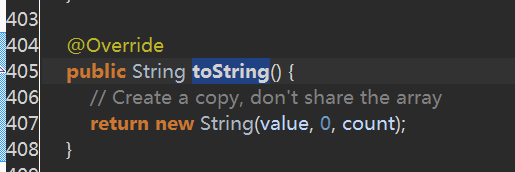一、序言
今天发现了一个很有趣的问题,在群里和朋友们讨论的也比较激烈,我现在给大家阐述一下问题。
二、发现问题
上代码。。。
package com.hzwealth.test.question; public class IntegerTest { public static void main(String[] args) { //Integer Integer a=10,b=10,c=150,d=150; System.out.println(a==b); System.out.println(c==d); System.out.println(a.equals(b)); System.out.println(c.equals(d)); //String String str=new String("AB"); String str1 ="A"; String str2 = str1+"B"; String str3="AB"; System.out.println(str==str3); System.out.println(str==str2); System.out.println(str2==str3); } }
三、解决问题
1、Integer的问题,首先我们先看上面代码的 a==b会输出什么呢,答案是true,这个毋庸置疑,但是c==d会输出什么呢,答案是false,为什么呢?
(1)Integer是基本数据类型的int的引用类型,官方语言叫做装箱类型,我们来看一下Integer的源码
//Integer的取值 public static Integer valueOf(int i) { assert IntegerCache.high >= 127; if (i >= IntegerCache.low && i <= IntegerCache.high) return IntegerCache.cache[i + (-IntegerCache.low)]; return new Integer(i); } private static class IntegerCache { static final int low = -128; static final int high; static final Integer cache[]; static { // high value may be configured by property int h = 127; String integerCacheHighPropValue = sun.misc.VM.getSavedProperty("java.lang.Integer.IntegerCache.high"); if (integerCacheHighPropValue != null) { int i = parseInt(integerCacheHighPropValue); i = Math.max(i, 127); // Maximum array size is Integer.MAX_VALUE h = Math.min(i, Integer.MAX_VALUE - (-low)); } high = h; cache = new Integer[(high - low) + 1]; int j = low; for(int k = 0; k < cache.length; k++) cache[k] = new Integer(j++); } private IntegerCache() {} }
从源码我们可以看出,Integer的值为-128-127之间的时候就会自动的从Integer的缓存(IntegerCache)中去取,如果超过这个范围就会新建一个Integer的对象。
所以a==b(a=10,b=10)为true,c==d(c=150,d=150)为false。
2、我们来看一下String的这个问题
(1)str==str3 为false,因为,str新建了一个对象,str3是常量池中的对象,所以这两个为false。
(2)str2==str3,这个解释引用我群友 成都-119-EbranHan-Java 的解释:

new 了一个 StringBuilder,然后调用了append方法,对应的就是:String str2 = str1+"B";
这里还提到了字面量和引用,String str3="AB",这就是字面量,而引用就是,String str=new String("AB");我们自己定义的。
字面量 jvm 优化过,直接就扔到常量池去了。
下面是StringBuilder的toString方法,这里也是新建了一个String方法

综上所述,str2==str3也为false。
补充:这里的“+”不是用的String 的concat的方法,而是用的是StringBuilder来写的。而且,就算是用concat的方法也是new了一个String的对象。下面是concat的源码:
public String concat(String str) { int otherLen = str.length(); if (otherLen == 0) { return this; } int len = value.length; char buf[] = Arrays.copyOf(value, len + otherLen); str.getChars(buf, len); return new String(buf, true); }
(3)str==str2,这个也毋庸置疑的为false了,因为str是new出来的String对象,str2也是相当于new出来的一个对象。所以为false。
四、评语
以上是我根据自己查阅资料以及和群友的交流下写出的总结,如果有不正确的地方,还望大牛指正!